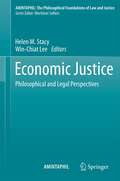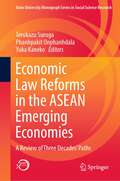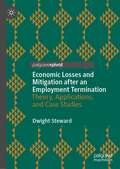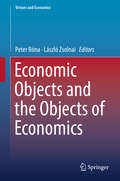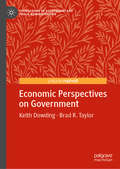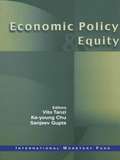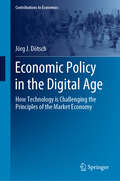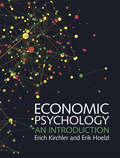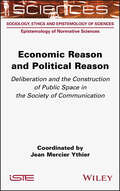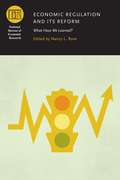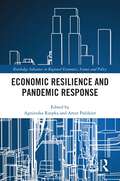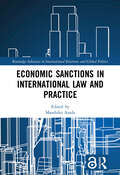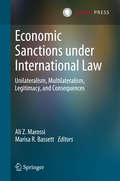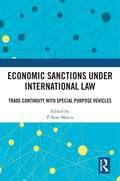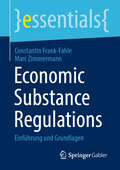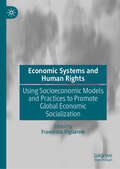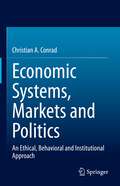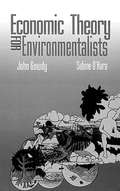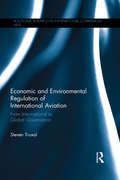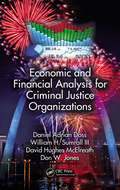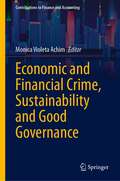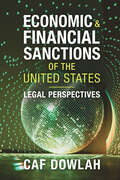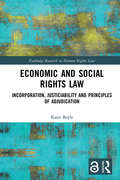- Table View
- List View
Economic Justice: Philosophical and Legal Perspectives
by Helen M. Stacy Win Chiat LeeThe economic impact of the U. S. financial market meltdown of 2008 has been devastating both in the U. S. and worldwide. One consequence of this crisis is the widening gap between rich and poor. With little end in sight to global economic woes, it has never been more urgent to examine and re-examine the values and ideals that animate policy about the market, the workplace, and formal and informal economic institutions at the level of the nation state and internationally. Re-entering existing debates and provoking new ones about economic justice, this volume makes a timely contribution to a normative assessment of our economic values and the institutions that active those norms. Topics covered by this volumes essays range from specific or relatively small-scale problems such as payday lending and prisoners' access to adequate healthcare; to large-scale such as global poverty, the free market and international aid. Economic Justice will stimulate and provoke philosophers, policy makers, the engaged readers who and better outcomes from financial institutions and more effect distribution of economic goods.
Economic Law Reforms in the ASEAN Emerging Economies: A Review of Three Decades’ Paths (Kobe University Monograph Series in Social Science Research)
by Yuka Kaneko Terukazu Suruga Phanhpakit OnphanhdalaThis book reviews the periodic changes in the legal policies of the late-developing ASEAN countries, often known as the CLMV countries (Cambodia, Laos, Myanmar, and Vietnam), in their continuous path toward globalization after the collapse of the socialist bloc. The book also identifies the characteristics of the legal reforms in their present stage guided by the common framework under the ASEAN Economic Community (AEC) moving toward 2025.The first stage is illustrated by the ASEAN-style utilization of foreign investments as reflected in all investment laws and policies of CLMV countries in the 1990s, which featured entry control (as “sticks”) and investment incentives (as “carrots”). Those controls and incentives were the means to induce investors to assume various performance requirements to contribute to industrial policies. The second stage witnessed a shift toward enhanced liberalization as an endeavor toward the WTO accession during the 2000s, as seen in the integrated investment laws that appealed for the national treatment of foreign investors. At the same time, those investment laws emphasized the substantive provisions (e.g., fair and equitable treatment and indirect expropriation) and procedural protections (e.g., provision of Investor–State Dispute Resolution mechanisms) as an appeal for stabilization of the investment climate. The third stage of legal policy, as evidenced by the recent amendments to the investment laws, is newly focused on environmental and social considerations, which seems to be an indispensable response to the increasing social protests against the negative impacts of investment promotion. Simultaneously, the means of administrative controls over investors, established in the first stage, are uniquely utilized for the realization of new goals.
Economic Liberties and the Constitution
by Bernard H. SieganIn this seminal work, Bernard Siegan traces the history of onstitutional protection for economic liberties in the United States. He argues that the law began to change with respect to economic liberties in the late 1930s. At that time, the Supreme Court abdicated much of its authority to protect property rights, and instead condoned the expansion of state power over private property.Siegan brings the argument originally advanced in the .first edition completely up to date. He explores the moral position behind capitalism and discusses why former communist countries flirting with decentralization and a free market (for instance, China, Cambodia, Vietnam, and Laos) have become more progressive and prosperous as a result. He contrasts the benefits of a free, deregulated economy with the dangers of over-regulation and moves towards socialized welfare most specifically as happened during Franklin Roosevelt's presidency. Supporting his thesis with historical court cases, Siegan discusses the past and present status of economic liberties under the Constitution, clarifies constitutional interpretation and due process, and suggests ways of safeguarding economic liberties.About the original edition, Doug Bandow of Reason noted, "Siegan has written a vitally important book that is sure to ignite an impassioned legal and philosophical debate. The reason the necessity for protecting economic liberty is no less than that guaranteeing political and civil liberty." Joseph Sobran of the National Review wrote, "Siegan...makes a powerful general case for economic liberty, on both historical and more strictly empirical grounds.... Siegan has done a brilliant piece of work, not only where it was badly needed, but where the need had hardly been recognized until he addressed it." And Edwin Meese remarked that, "This timely and important book shows how far we have drifted from protecting basic liberties that the Framers of the Constitution sought to secure. I recommend it highly." This new, completely revised edition of Economic Liberties and the Constitution will be essential reading for students of economics, history, public policy, law, and political science.
Economic Losses and Mitigation after an Employment Termination: Theory, Applications, and Case Studies
by Dwight StewardThis Palgrave Pivot provides a conceptual and practical discussion of the factors that comprise a standard economic damage model in an employment termination case. This book discusses the economic factors and assumptions that comprise an economic damages model in an employment termination case. It also provides a discussion of the valuation of employee fringe benefits and employee stock option valuations. Background on the concept of discounting and discussions of the required information in employment cases are also provided. Readers are able to see the analysis in action, with case studies revolving around highly skilled individuals, less skilled individuals, public sector employees, highly educated individuals, managers and executives, and defamation and damage to reputation.
Economic Objects and the Objects of Economics
by László Zsolnai Peter RónaThis book examines the nature of economic objects that form the subject matter of economics, and studies how they resemble or differ from the objects studied by the natural sciences. It explores the question of whether economic objects created by modern economics sufficiently represent economic reality, and confronts the question whether tools, techniques and the methodology borrowed from the natural sciences are appropriate for the analysis of economic reality. It demonstrates the unsustainability of rational choice theory. It looks at economic agents, such as individuals, groups, legally constituted entities, algorithms, or robots, how they function and how they are represented in economics. The volume further examines the extent, if any, that mathematics can represent the objects of the economy, such as supply and demand, equilibrium, marginal utility, or the money supply as they actually occur in the economy, and as they are represented in economics. Finally, the volume explores whether the subject matter of economics – however defined – is the proper subject of theoretical knowledge, whether economics is an analytic or a descriptive discipline, or if it is more properly seen in the domain of practical reason. Specifically, the book looks at the importance and the ambiguity of the ontology of modern economics, temporality, reflexivity, the question of incommensurability, and their implications for economic policy.
Economic Perspectives on Government (Foundations of Government and Public Administration)
by Keith Dowding Brad R. Taylor“Dowding and Taylor offer student and scholar alike a clear and compelling perspective on the foundations of political economy. Their narrative coherently frames the scholarship of the last half century, and persuasively applies it to the recurring problems facing groups, markets, and whole societies.”—Kenneth A. Shepsle, Harvard University, USAThis book introduces and applies the economic way of thinking to public policy and public administration. It provides a non-technical introduction and assumes no prior economic or mathematical training but looks closely at the methodological and normative assumptions underlying economic analysis. It provides a deep understanding of the method than a simple technical presentation would allow. After introducing the basic assumptions of the economic method, the book considers the analysis of market failure, the role of government in a market economy, behavioural economics, bargaining in government, bureaucracy, interest groups, and levels of government. By providing a balanced introduction to and overview of economic approaches to government, the book will be useful to undergraduate and postgraduate students in public administration and public policy, as well as academics and practitioners in these fields interested in the application of the economic way of thinking.
Economic Policy and Equity
by Vito TanziDuring the past decade, income gaps have widened in many parts of the world, industrial as well as developing. These have heightened concern about equity issues in economic policymaking. Equity and growth can be complementary: investment in human capital, for example, can boost growth in the long run. But choices are not always so easy. If growth and equity do not go hand in hand, when and how should governments ensure that the size of the pie increases and that everybody gets a fair share? This volume brings together the views not only of senior policymakers and academics but also of religious leaders and labor leaders from around the world who participated in an unprecedented IMF conference on the topic in June 1998. Contents include: Stanley Fischer, A View from the IMF IMF Fiscal Affairs Department, Should Equity Be a Goal of Economic Policy? Amartya Sen, Economic Policy and Equity: An Overview Anthony Atkinson, Equity Issues in a Globalizing World: The Experience of OECD Countries Lawrence Summers, Equity in a Global Economy Equity-Oriented Policymaking: Country Experience Eduardo Aninat and others, Addressing Equity Issues in Policymaking: Grzegorz Kolodko, Equity Issues in Policymaking in Transition Economies Anibal Cavaco Silva, Political Economy and the Equity-Policy Agenda Alberto Alesina, Too Large and Too Small Governments Enrique Iglesias, Equity Issues in Latin America Vito Tanzi is director of the Fiscal Affairs Department of the IMF. Ke-young Chu is a senior advisor and Sanjeev Gupta is a division chief in the department. An International Monetary Fund Book
Economic Policy in the Digital Age: How Technology is Challenging the Principles of the Market Economy (Contributions to Economics)
by Jörg J. DötschThis book addresses how digital technology is challenging the principles of the market economy and the consequences for economic policy. Applying the approach of the Freiburg School as a heuristic perspective, the study examines the concrete effects of digital technology on the price system and monetary policy, the openness of markets, the role of private property, and labour markets. It highlights the emergence of digital innovations such as digital currencies, digital goods, artificial intelligence, digital platforms and the sharing economy and discusses the challenges these innovations pose for economic governance and the development of adequate economic policy instruments. This comprehensive overview provides a basic understanding of the scope of the digital transformation and addresses a wide scale of important aspects of e.g. competition and trade policy, the impact of robotisation on labour market policy, and how economic policy must incorporate social aspects. The book appeals to scholars and students of economics, public management professionals, and anyone interested in the challenges of digitalisation in the context of economic policy.
Economic Psychology: An Introduction (Journal Of Psychology Ser.)
by Erich Kirchler Erik HoelzlEconomic Psychology is the only up-to-date, English-language textbook that provides a comprehensive overview of theoretical topics in economic psychology and their relevance in applied fields. Written by two leading psychologists, the book looks at how people make decisions on the use of scarce resources, in particular money, from a psychological perspective. Starting with decision making and lay theories as basic building blocks of economic behaviour, the authors go on to explore three major markets where economic behaviour occurs as an interaction between individuals and companies or institutions - consumer markets, labour markets and financial markets - before considering the challenges of collective cooperation and economic prosperity. Featuring numerous applied examples throughout, each chapter also includes an overview, a summary, figures, key terms, student questions and suggestions for further reading. This introduction is an essential resource for advanced undergraduate and postgraduate courses on economic psychology, behavioural economics and social psychology.
Economic Reason and Political Reason: Deliberation and the Construction of Public Space in the Society of Communication
by Jean Mercier YthierThe public space of democracies is constructed in a context that is marked by the digital transformation of the economy and society. This construction is carried out primarily through deliberation. Deliberation informs and guides both individual and collective action. <p><p> To shed light on the concept of deliberation, it is important to consider the rationality of choice; but what type of rationality is this? References to economic reason are at once widespread, crucial and controversial. This book therefore deals with arguments used by individuals based on the notions of preferential choice and rational behavior, and also criticizes them. These arguments are examined in the context of the major themes of public debate that help to construct the contemporary public space: "populism", social insurance, social responsibility and environmental issues. <p><p> Economic Reason and Political Reason underlines the importance of the pragmatist shift of the 2000s and revisits, through the lens of this new approach, the great utilitarian and Rawlsian normative constructs that dominated normative political economics at the end of the 20th century. Alternative approaches, based on the concept of deliberative democracy, are proposed and discussed.
Economic Regulation and Its Reform: What Have We Learned?
by Nancy L. RoseThe past thirty years have witnessed a transformation of government economic intervention in broad segments of industry throughout the world. Many industries historically subject to economic price and entry controls have been largely deregulated, including natural gas, trucking, airlines, and commercial banking. However, recent concerns about market power in restructured electricity markets, airline industry instability amid chronic financial stress, and the challenges created by the repeal of the Glass-Steagall Act, which allowed commercial banks to participate in investment banking, have led to calls for renewed market intervention. Economic Regulation and Its Reform collects research by a group of distinguished scholars who explore these and other issues surrounding government economic intervention. Determining the consequences of such intervention requires a careful assessment of the costs and benefits of imperfect regulation. Moreover, government interventions may take a variety of forms, from relatively nonintrusive performance-based regulations to more aggressive antitrust and competition policies and barriers to entry. This volume introduces the key issues surrounding economic regulation, provides an assessment of the economic effects of regulatory reforms over the past three decades, and examines how these insights bear on some of today’s most significant concerns in regulatory policy.
Economic Resilience and Pandemic Response (Routledge Advances in Regional Economics, Science and Policy)
by Agnieszka Rzepka Artur PaździorThe COVID-19 pandemic upended our social and economic lives. Lockdowns forced firms to implement health and safety protocols, employees to work from home, and businesses of all sorts to close. Even as lockdowns eased, the landscape of work, commerce, leisure, and education was irrevocably transformed. While in many ways life has returned to normal, many of the changes wrought by the pandemic are here to stay. This book presents research on these transformations, examining how the economy and society were impacted. Organizing different aspects of the pandemic into individual chapters, this book examines issues such as financing structures, liquidity, profitmaking, investment, financial security, and market valuation, among other topics. Reflecting deep research as well as an extensive review of the literature, each chapter provides not just theoretical and empirical insight but also a set of policy recommendations to insure against similar crises in the future. Encompassing a range of case studies, it outlines strategies for dealing with the manifold challenges of today’s business environment. This book showcases the development of particular sectors over the course of the pandemic, and as such, serves as a valuable study, enabling a comprehensive analysis of topics ranging from economics to social dynamics. It provides a deep understanding of this unique period's wide-ranging challenges and transformations and underscores the central economic concern of the pandemic's effect on economic security, a topic discussed throughout several chapters. Furthermore, it includes a discussion on the broader scope of “polycrisis". This volume was designed to appeal to a wide range of readers interested in economics, management, regional studies, and related fields.
Economic Sanctions in International Law and Practice (Routledge Advances in International Relations and Global Politics)
by Masahiko AsadaProviding perspectives from a range of experts, including international lawyers, political scientists, and practitioners, this book assesses current theory and practice of economic sanctions, discussing current legal and political challenges faced by the international community. It examines both the implementation of sanctions by major powers – the United States, the European Union, and Japan – as well as assessing the impact of those sanctions through case studies of Russia, Iran, Syria, and North Korea. Balancing theoretical analysis of legal considerations with national and regional level empirical analysis, it also includes coverage of sanctions issues by the UN Security Council and the EU, as well as the extraterritorial application of sanctions. A valuable reference for academics and practitioners, Economic Sanctions in International Law and Practice will be useful to those working in the fields of international law, diplomacy, and international political economy.
Economic Sanctions under International Law
by Ali Z. Marossi Marisa R. BassettSince the Second World War, States have increasingly relied upon economic sanctions programs, in lieu of military action, to exert pressure and generally to fill the awkward gap between verbal denunciation and action. Whether or not sanctions are effective remains a point of contention among policymakers. Frequently asked questions include whether any legal order constrains the use of sanctions, and, if so, what the limits on the use of sanctions are. This volume gathers contributions from leading experts in various relevant fields providing a seminal study on the limits of economic sanctions under international law, including accountability mechanisms when sanctioning States go too far. Where there are gaps in the law, the authors provide novel and important contributions as to how existing legal structures can be used to ensure that economic sanctions remain within an accepted legal order. This book is a most valuable contribution to the literature in the fields of international economic law, public international law and international dispute resolution. Ali Z. Marossi is an advisory board member of The Hague Center for Law and Arbitration. Marisa R. Bassett is Associate Legal Officer in the Office of the Prosecutor for the ICTY and former Associate at White & Case LLP.
Economic Sanctions under International Law: Trade Continuity with Special Purpose Vehicles
by P. Sean MorrisThe effects of US secondary sanctions are broad and are often designed to cripple the target country’s economy and currency. Some states have sought to circumvent these sanctions by setting up a special purpose vehicle to facilitate trade and financial transactions with the sanctioned country on humanitarian grounds. Although the nature of these special purpose vehicles is new and experimental, they are little understood, not least how they operate and function in international law. This volume addresses this gap by identifying and examining some of the legal issues that a special purpose vehicle such as the Instrument in Support of Trade Exchanges (INSTEX) generates. The collection brings together leading legal academics, sanctions practitioners and policy experts to provide an assessment of the special purpose vehicle in the context of secondary sanctions in international law. It will be of interest to researchers and academics in International law, Security law, Economic law and Comparative law.
Economic Substance Regulations: Einführung und Grundlagen (essentials)
by Marc Zimmermann Constantin Frank-FahleInternational angelegte Steuervermeidungsstrategien von Unternehmen sind in der Vergangenheit in den Fokus der öffentlichen Wahrnehmung gerückt. Offshore-Strukturen wurden u. a. durch multinationale Unternehmen zur Gewinnverlagerung und -verkürzung genutzt. Die OECD hat als Antwort darauf einen BEPS-Aktionsplan entwickelt, der zur Bekämpfung dieser Praktiken vorsieht, dass die Gesellschaft bei Ausführung einer relevanten Tätigkeit eine wirtschaftliche Substanz (Economic Substance) aufweisen muss. Die seitens der OECD aufgestellten Mindestanforderungen bilden den internationalen Standard und wurden in zahlreichen Niedrigsteuerjurisdiktionen umgesetzt. Das essential vermittelt kompakt das erforderliche Grundwissen zu Economic Substance Regulations und informiert praxisnah über deren Umsetzung in den einzelnen Staaten.
Economic Systems and Human Rights: Using Socioeconomic Models and Practices to Promote Global Economic Socialization
by Francesco VigliaroloEconomic systems driven by monetary interests have enabled individuals, international institutions, and governments to prioritize financial gain and budget constraints over people. This has placed global dominance above human rights. This edited volume tackles the relationship between human rights and economic systems, providing new ways to help countries prioritize human rights in their economies. It includes contributions from scholars actively involved with the UNESCO Chair in Economic Systems and Human Rights, founded at the National University of La Plata. These contributors specialize in a range of topics within different disciplines, including economics, sociology, history, geography, law, and philosophy. Providing historical insights into past and present conditions, the contributors explore the best ways to reform modern economic systems to ensure they promote human rights. The first half of the book includes theoretical proposals and underlying themes, while the second half offers concrete models and practices for use in today’s dominant economic systems. Unique contributions within chapters include frameworks readers can use to apply socioeconomic theory at both national and international levels. The book examines structural problems such as socio-environmental crises, increased rates of inequality, and gaps between the economy and society. It discusses the transformation of dominant socio-economic theory as it relates to financial systems, productive labor markets, social participation, and the relationship between the economy, society, and the environment. Chapters directly address the loss of the ontological function in economies and propose new approaches to existing economic systems, drawing on scholars such as Adam Smith, who is well-known for his idea of the “invisible hand.” The resulting book presents a modern approach to national and international well-being built around human rights. Readers will learn about the socioeconomic models and practices that best promote economic socialization and how this relates to global values shared across economies.
Economic Systems, Markets and Politics: An Ethical, Behavioral and Institutional Approach
by Christian A. ConradThis textbook takes a new approach to economics by taking into account behavioral sciences and ethics. The basics of institutional economics are the starting point of the book, which are combined with insights from business ethics and behavioral science. It analyzes human behavior in order to discover incentives for economic agents to behave in a welfare-maximizing way, and analyzes the impact of human behavior and morality on economic systems, markets and politics. This textbook draws from new research results from behavioral economics, as well as from other disciplines, such as psychology and sociology, thus leading to new conclusions for economic science. The book sheds light on how people behave and how such behavior can be guided towards moral welfare for everyone. Furthermore, the reader is introduced to behavioral games, and to how these can be used to study economic behavior. Each chapter contains a summary on behavioral science findings as well as one on ethical findings. This book is a must read for advanced students in economics and political science but can also be of use to researchers of economics, as well as policymakers and business executives due to its focus on applications.
Economic Theory for Environmentalists
by John GowdyEconomic Theory for Environmentalists is a much-needed and heralded new book that examines the implications of neoclassical economic theory and how it relates to the environment and environmental activity. It addresses the ongoing conflict between market forces and environmental integrity and explains how neoclassical economic theory views the relationship between economic activity and the natural world. Each chapter outlines the concepts of economic theory and the relevance of its environmental and policy implications. It focuses on both micro and macro-economics. Policy tools such as price and income elasticities, consumer surplus and methods for measuring the economic value of environmental resources are discussed. A case study which examines a range of policy options is presented. Examples are also given throughout the text to illustrate regional and international policy questions. Presented in a simple and easy to understand manner, this valuable book is suited for anyone dealing with environmental, economic, or policy issues.
Economic and Environmental Regulation of International Aviation: From Inter-national to Global Governance (Routledge Research in International Commercial Law)
by Steven TruxalThe core structure of the regulatory regime for international civil aviation (the ‘Chicago System’) is inter–national. The features of the Chicago System were designed in an era when the world’s airlines were State–owned, and the most pressing international concerns were for navigation and safety regulation. Economic liberalization and intense globalization since the Second World War have impacted on the industry; today, it is global. This book observes the developing governance of global aviation, taking into account the concepts of sovereignty, jurisdiction and territoriality, and the proliferation of actors and participants as partners in a global public policy network, to posit that an upgraded system of global governance for civil aviation helps to explain the emerging complex landscape for global governance of civil aviation. As evidence of the emerging, complex matrix of governance of global aviation, this book identifies and reviews a selection of contemporary, transnational economic and environmental challenges facing the globalized aviation sector, e.g. fair competition safeguards, consumer protection, noise pollution and greenhouse gas emissions, and the respective ‘legal’ and policy actions taken at national level (United Arab Emirates, Qatar and People’s Republic of China), regional level (the European Union) and international level (UN Framework Convention on Climate Change and International Civil Aviation Organization). The book concludes that economic and environmental regulation of international aviation, designed for an inter–national world of yesterday, evolves into global governance of aviation, which is more suited for today’s global world. This book will be of particular interest to scholars and practitioners of aviation law, competition law and environmental law, as well as in the areas of transnational law, global governance and international relations.
Economic and Financial Analysis for Criminal Justice Organizations
by Daniel Adrian Doss William H. Sumrall III David H. McElreath Don W. JonesFrom small law offices to federal agencies, all entities within the justice system are governed by complicated economic factors and face daily financial decision-making. A complement to Strategic Finance for Criminal Justice Organizations, this volume considers the justice system from a variety of economic and financial perspectives and introduces
Economic and Financial Crime, Sustainability and Good Governance (Contributions to Finance and Accounting)
by Monica Violeta AchimThis book addresses the most widespread forms of financial crime today, namely corporate fraud, corruption, tax fraud, the shadow economy, informal entrepreneurship, money laundering, international informal capital flows, cybercrimes, and cryptocurrency scams. Given the rapid rise of digitalization, especially due to the COVID-19 pandemic, there has been a huge surge in financial crime, especially in the form of cybercrime, which affects people’s financial security. Hence, the aim of this book is to stress the connected nature of financial crime and good governance, in order to achieve the most positive, sustainable development of society. The book analyzes financial crime in the context of digitalization. On the one hand, digitalization offers clear advantages in terms of reducing classical types of fraud such as tax evasion, corruption, the shadow economy, etc. On the other hand, digitalization offers new channels for criminals to gain illegal benefits when operating in digital space, e.g. through cybercrime, bank fraud, FinTech fraud, e-commerce fraud, etc. In this context, the term “digital shadow economy” has recently emerged in the literature as an expression of the types of fraud committed in digital space. In addition, the book explores issues concerning changes in regulations for various financial crimes around the world, statistics, and ways to combat digital crimes including punitive, preventive and other measures. Special attention is paid to cybercrime and cybersecurity issues, the goal being to raise readers’ awareness of these threats.
Economic and Financial Sanctions of the United States: Legal Perspectives
by Caf DowlahFrom the Cold War era to the current century, the United States has wielded substantial authority in imposing sanctions. This book delves into the intricate and multifaceted landscape of US economic and financial sanctions, unravelling their historical development, legal foundations, and geopolitical motivations. Case studies on five of the most-sanctioned countries in the world – Russia, Iran, Iraq, Cuba, and Venezuela—provide a deeper understanding of how the sanctioning measures allow the US to extend its reach beyond its national boundaries through extraterritorial laws, sophisticated enforcement mechanisms, and the pervasive dollar-denominated global economic structure. Meticulous and nuanced, this book is a go-to resource for understanding sanction regimes from both multilateral and unilateral perspective and the relevant international laws and jurisprudence.
Economic and Legal Considerations of Optimal Privatization: Case Studies of Mortgage Firms (DePfa Group and Fannie Mae)
by Claudia Dziobek Hans-Joachim Beyer John R. GarrettA report from the International Monetary Fund.
Economic and Social Rights Law: Incorporation, Justiciability and Principles of Adjudication (Routledge Research in Human Rights Law)
by Katie BoyleThis book develops principles of adjudication to facilitate accountability for violations of Economic and Social Rights. Economic and Social Rights engage with areas relating to social justice and their violation tends to impact on the most vulnerable members of society. Taking the UK as a case study, the book draws on international experience and comparative practice, including progressive reform at the devolved subnational level, that demonstrate the potential reach of Economic and Social Rights when the rights are given legal standing in domestic settings according to their status in international law. The work looks at different models of incorporation of rights into domestic law and sets out existing justiciability mechanisms for their enforcement as well as future models open to development. In so doing the book develops principles of adjudication drawn from deliberative democracy theory that help address some of the critiques of social rights adjudication. This book will have a global and cross-sectoral appeal to legal practitioners, the judiciary and the civil services, as well as to researchers, academics and students in the fields of human rights law, comparative constitutional law and deliberative democracy theory.
